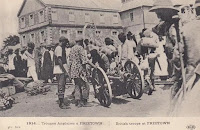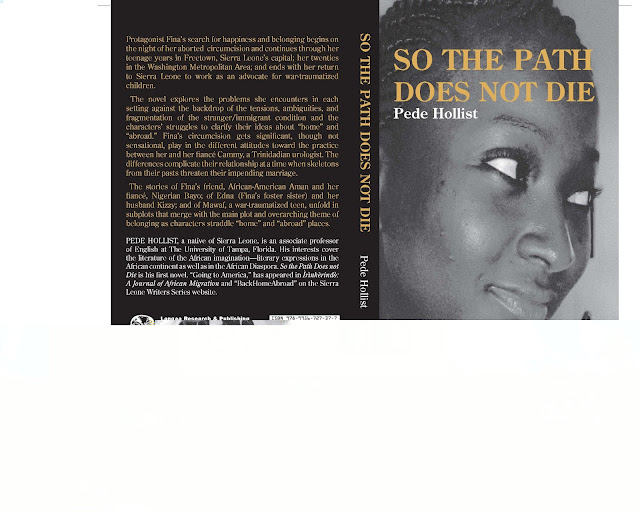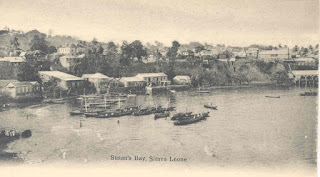Vitabu Reads | Kinship Bonds by Shek Gibril Kamara
Shek Gibril Kamara's landmark book “Kinship Bonds” is an all West African story.
Compressed into about 180 pages, the book's storyteller frames the empires of the past against Bamako, Mali.
No doubt, the narrator is teaching history. Told for you, me, and West Africa's population today of over 335 million people.
Kamara's narrative voice and griot in “Kinship Bonds” is omniscient; an interpreter/superlative source of information.
One problem though is the book's confusing estimation of time; although we get copious examples of location.
Iconic villages such as Kindiaso, Sokudala, Kurudala, and bigger towns like Makeni drive or influence the nostalgic theme of the book.
Compared to similar literature in Sierra Leonean Writers Series, “Kinship Bonds” informs about rural life in the Mano River basin and the empires of medieval West Africa.
Of note, Kamara's previous work, The Spirit of Badenia, is a university textbook on African Studies and Cultural Anthropology in the U.S.A.
Kinship Bonds starts with the birth of a baby boy to Kemoba, a wealthy man, and his self-sacrificing third wife, Hamie.
Kemoba, or Old Man, balances an incongruous life as a businessman and a cleric. There's also the stiff competition between Marma, his first wife; Iyesata, the wife who shares his bed; and Hamie, the young wife he posted an hour's walk away to mind his strategically placed grocery store.
Other characters include Hamie's sister, Fanta; their not-so-young, black and proud neighbor, Magoffin; Musa, a cousin of Kemoba; Farmoli, the prayer caller; Bala, Kemoba's brother; conservative uncle, Pa Mahdi; enigmatic sister-aunt, Ya Iye; as well as Sento, her assistant priestess on the rise.
Over time, the book winds through the cultural mores that roil the life of Hamie's family and affect the story with Salem-like trials of people accused of witchcraft.
I liked Kinship Books' style, culture, and music. Specifically the “unmistakable melodies of the balanji” and the pre-dawn ritual of the djelli. I would listen and hear more. I encourage others to read.
Sadly there's no Preface/Introduction, although the book fulfills in an abundance richness its purpose/ and its argument.
Click here to buy
Compressed into about 180 pages, the book's storyteller frames the empires of the past against Bamako, Mali.
No doubt, the narrator is teaching history. Told for you, me, and West Africa's population today of over 335 million people.
Kamara's narrative voice and griot in “Kinship Bonds” is omniscient; an interpreter/superlative source of information.
One problem though is the book's confusing estimation of time; although we get copious examples of location.
Iconic villages such as Kindiaso, Sokudala, Kurudala, and bigger towns like Makeni drive or influence the nostalgic theme of the book.
Compared to similar literature in Sierra Leonean Writers Series, “Kinship Bonds” informs about rural life in the Mano River basin and the empires of medieval West Africa.
Of note, Kamara's previous work, The Spirit of Badenia, is a university textbook on African Studies and Cultural Anthropology in the U.S.A.
Kinship Bonds starts with the birth of a baby boy to Kemoba, a wealthy man, and his self-sacrificing third wife, Hamie.
Kemoba, or Old Man, balances an incongruous life as a businessman and a cleric. There's also the stiff competition between Marma, his first wife; Iyesata, the wife who shares his bed; and Hamie, the young wife he posted an hour's walk away to mind his strategically placed grocery store.
Other characters include Hamie's sister, Fanta; their not-so-young, black and proud neighbor, Magoffin; Musa, a cousin of Kemoba; Farmoli, the prayer caller; Bala, Kemoba's brother; conservative uncle, Pa Mahdi; enigmatic sister-aunt, Ya Iye; as well as Sento, her assistant priestess on the rise.
Over time, the book winds through the cultural mores that roil the life of Hamie's family and affect the story with Salem-like trials of people accused of witchcraft.
I liked Kinship Books' style, culture, and music. Specifically the “unmistakable melodies of the balanji” and the pre-dawn ritual of the djelli. I would listen and hear more. I encourage others to read.
Sadly there's no Preface/Introduction, although the book fulfills in an abundance richness its purpose/ and its argument.
The West Africans who laid the foundations of their medieval empires during the centuries before 900 c.e. did not develop a written language they could use to record historical events. Therefore, historians have a limited amount of evidence to draw on. Many of the events and dates in history from this time can only be approximate.
Click here to buy



Comments
Post a Comment